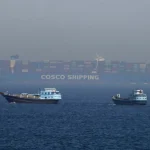
Authored by Michael Kern via OilPrice.com,
A Spanish city on the northern coast of Africa between the Mediterranean and the Atlantic Ocean, notorious for being a drug-trafficking hub, has become a major new hub of ship-to-ship transfers of Russian oil and illicit activities aimed at obscuring the origin of the crude, maritime consultancy Windward Ltd said in a report carried by Bloomberg.
Waters around the Spanish city of Ceuta in North Africa have become the scene of an increasing number of ship-to-ship transfers since the Russian invasion of Ukraine.
The activity is clearly linked to Russia, according to Windward.
Russia is believed to be looking to mask tanker routes and locations amid the rising use of a vast “dark fleet” to evade Western sanctions and the price caps on Russian oil and products.
According to Windward, port calls in North Africa have seen a 147% jump in tankers, mostly crude oil tankers, from Russia. STS transshipment and dark activities in the Black Sea have also soared since the Russian invasion of Ukraine. The dark activities are mainly being carried out by tankers registered in countries such as Panama, Malta, Liberia, or Cameroon, Windward says.
An unusually large number of tankers have changed ownership in recent months in what analysts and shipping industry officials believe is a push from Russia to continue shipping large volumes of its crude and entities willing to profit from the Russian oil trade in a sanctions regime. The ‘dark’ or ‘shadow’ fleet of oil tankers is growing to now include tankers not only shipping sanctioned Iranian and Venezuelan oil, but also increasingly larger volumes of Russian oil and products.
Meanwhile, loadings of Russia’s flagship Urals crude using ship-to-ship (STS) transfers in the Mediterranean surged eight times in January from December to a record in the first full month in which the EU banned seaborne imports of Russian oil. STS loadings, used by traders to move the crude from smaller tankers onto larger ones to make the journey to Asia profitable, have soared since the EU ban came into effect on December 5, according to data from Refinitiv Eikon cited by Reuters earlier this month.
Authored by Michael Kern via OilPrice.com,
A Spanish city on the northern coast of Africa between the Mediterranean and the Atlantic Ocean, notorious for being a drug-trafficking hub, has become a major new hub of ship-to-ship transfers of Russian oil and illicit activities aimed at obscuring the origin of the crude, maritime consultancy Windward Ltd said in a report carried by Bloomberg.
Waters around the Spanish city of Ceuta in North Africa have become the scene of an increasing number of ship-to-ship transfers since the Russian invasion of Ukraine.
The activity is clearly linked to Russia, according to Windward.
Russia is believed to be looking to mask tanker routes and locations amid the rising use of a vast “dark fleet” to evade Western sanctions and the price caps on Russian oil and products.
According to Windward, port calls in North Africa have seen a 147% jump in tankers, mostly crude oil tankers, from Russia. STS transshipment and dark activities in the Black Sea have also soared since the Russian invasion of Ukraine. The dark activities are mainly being carried out by tankers registered in countries such as Panama, Malta, Liberia, or Cameroon, Windward says.
An unusually large number of tankers have changed ownership in recent months in what analysts and shipping industry officials believe is a push from Russia to continue shipping large volumes of its crude and entities willing to profit from the Russian oil trade in a sanctions regime. The ‘dark’ or ‘shadow’ fleet of oil tankers is growing to now include tankers not only shipping sanctioned Iranian and Venezuelan oil, but also increasingly larger volumes of Russian oil and products.
Meanwhile, loadings of Russia’s flagship Urals crude using ship-to-ship (STS) transfers in the Mediterranean surged eight times in January from December to a record in the first full month in which the EU banned seaborne imports of Russian oil. STS loadings, used by traders to move the crude from smaller tankers onto larger ones to make the journey to Asia profitable, have soared since the EU ban came into effect on December 5, according to data from Refinitiv Eikon cited by Reuters earlier this month.
Loading…






